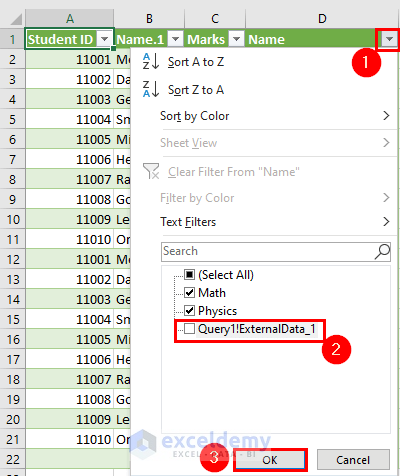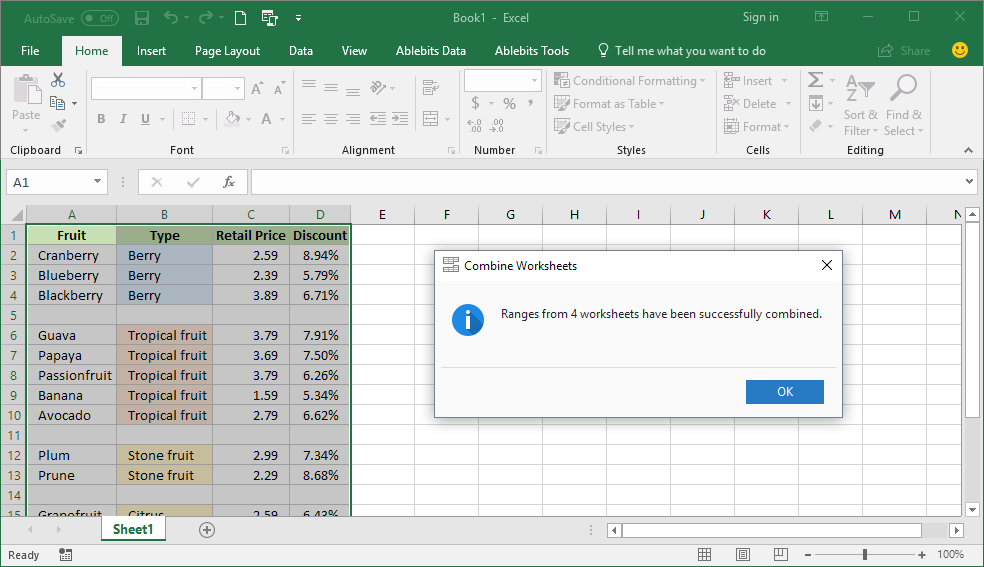5 Simple Ways to Combine Excel Sheets Instantly

When managing data in Microsoft Excel, combining sheets from different workbooks or within the same workbook is a common task. Whether you are consolidating reports, merging databases, or compiling information from multiple sources, knowing how to combine Excel sheets efficiently can save you time and reduce errors. Here are five simple yet effective methods to combine your Excel sheets instantly:
1. Using Excel’s Consolidate Feature

The Consolidate feature in Excel is perfect for summarizing data from multiple sheets into one sheet, either by position or category.
- Step 1: Open the workbook where you want to consolidate the data.
- Step 2: Select the cell where you want the consolidation to start.
- Step 3: Go to the Data tab and click on Consolidate in the Data Tools group.
- Step 4: In the Function box, choose the operation (e.g., Sum, Average, etc.).
- Step 5: Click Add to select the ranges from different sheets, and then click OK.
⚠️ Note: Remember to include the headers in your selection to ensure they are used as references for consolidating data.
2. Power Query for Combining Data

Power Query is an advanced tool for combining data from different sources. Here’s how you can use it to combine Excel sheets:
- Step 1: Go to the Data tab, click on Get Data > From File > From Workbook.
- Step 2: Select your workbook and choose the sheets you want to combine.
- Step 3: After loading, click on Append Queries or Merge Queries from the Combine group to merge the data.
- Step 4: Edit the steps as needed to align the data correctly.
- Step 5: Close & Load the query to see the combined data in your workbook.
📌 Note: Power Query provides flexibility in data manipulation, but it has a learning curve. Make sure you save your steps by keeping the Query Editor open.
3. Using VBA Macros to Automate Combining Sheets

For frequent data combining tasks, VBA macros can automate the process, saving you time:
- Step 1: Press Alt + F11 to open the VBA editor.
- Step 2: Insert a new module and paste the following code:
Sub CombineSheets()
Dim ws As Worksheet
Dim NewWs As Worksheet
Dim xRow As Long
Set NewWs = ThisWorkbook.Sheets.Add
xRow = 1
For Each ws In ThisWorkbook.Worksheets
If ws.Name <> NewWs.Name Then
ws.Rows(1).Copy Destination:=NewWs.Rows(xRow)
ws.Rows(“2:” & ws.Rows.Count).Copy Destination:=NewWs.Rows(xRow + 1)
xRow = NewWs.Cells(NewWs.Rows.Count, 1).End(xlUp).Row + 1
End If
Next
NewWs.Rows(1).Delete
End Sub
🔍 Note: This macro assumes the data in each sheet starts from row 1. Adjustments might be needed if your sheet structures vary.
4. Microsoft Query for Combining External Data

If you are pulling data from external sources, Microsoft Query can be an excellent tool:
- Step 1: On the Data tab, select Get External Data > From Other Sources > Microsoft Query.
- Step 2: Choose your data source, connect, and select the tables or sheets to combine.
- Step 3: Use the Query Designer to build your query, specifying how you want to join the data.
- Step 4: Return Data to Excel where you can refresh the data manually or automatically.
💡 Note: Microsoft Query is powerful for external data integration but requires some SQL knowledge for complex operations.
5. Using Third-Party Tools or Add-ins

For users who prefer graphical interfaces or lack VBA knowledge, third-party tools can simplify the process:
- Step 1: Research and install a reliable add-in like Kutools for Excel or Ablebits Merge Tables Wizard.
- Step 2: Follow the tool’s instructions to combine data from various sheets or workbooks.
- Step 3: Customize settings such as matching columns or handling duplicates based on your requirements.
🛠️ Note: Third-party tools might not be as flexible as custom VBA but offer quick solutions with minimal learning curve.
In the world of Excel, combining sheets is often more than just a data management task; it’s about bringing order to potentially chaotic information. By mastering these five methods, you can streamline your workflow, enhance data analysis, and make decision-making more informed and efficient.
What is the best method for combining sheets with different formats?

+
For sheets with different formats, using Power Query provides the most flexibility as it allows you to transform and align the data before merging.
Can I combine Excel sheets from different workbooks?

+
Yes, all the methods listed above, except the Consolidate feature, can work with sheets from different workbooks.
How do I handle duplicate headers when combining sheets?

+
When using tools like Power Query or Microsoft Query, you can manually adjust headers or remove duplicates. Alternatively, with VBA, you can write a script to handle duplicates programmatically.
What are the limitations of using VBA macros for combining sheets?

+
VBA macros can be complex for users not familiar with coding, and they might not support dynamic changes in data structure well. They also require maintaining the macro code for future use.
Can I refresh combined data automatically?

+
With methods like Power Query and Microsoft Query, you can set the data to refresh automatically upon opening the workbook or at set intervals.



